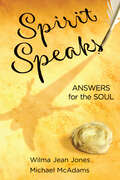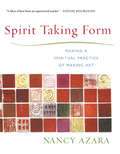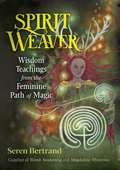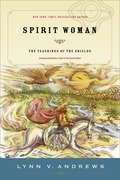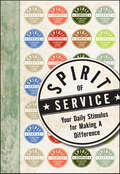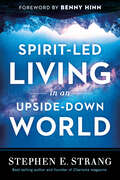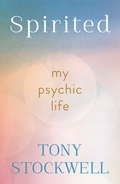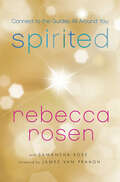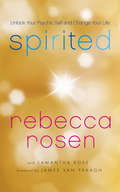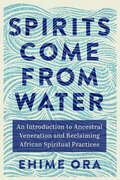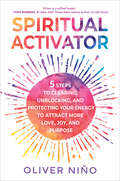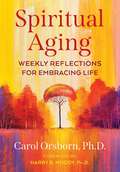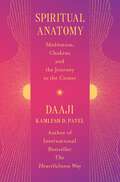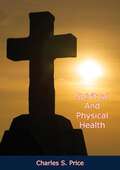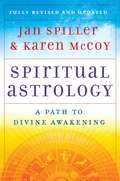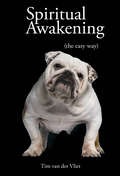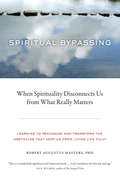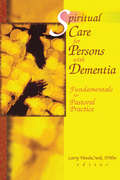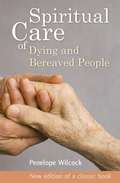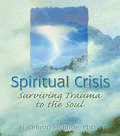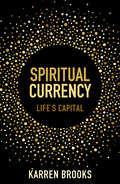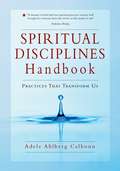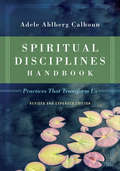- Table View
- List View
Spirit Speaks: Answers for the Soul
by Michael McAdams Wilma Jean JonesA renowned medium shares the words and wisdom of spiritual entities to guide you through your journey towards faith and understanding. Little did Wilma Jean Jones realize when she started dedicating her time to sessions receiving messages and teachings dictated directly from spirit teachers/angels that these sessions would continue for the next twenty-two years. This body of work and the deep teachings shared are given in first person by the spirit teachers themselves. &“We feel, we believe, we advise&” are used often in this material. &“Our view encompasses more than your view is allowed to comprehend&” illustrates the high level and perspective of the spirit teachers/angels presenting this information. Many of these teachings were given as personal messages for Wilma and her son Michael; however, many readers of this material have found a personal connection with these teachings. &“This sounds like they are talking to me; this sounds like what I&’m dealing with&” has been expressed by many who have read these messages. Allow these messages and teachings to open the door to communication with your own spirit teachers/angels as they ask for nothing more than to be acknowledged and recognized for the guidance and direction they are willing to share with our existence. Their joy is our recognition in their existence and our willingness to incorporate their teachings into our everyday lives as we walk our chosen path.
Spirit Taking Form
by Nancy AzaraAnyone can make art. Finding one's spiritual center can come of making art. Making art can come of finding one's spiritual center. Nancy Azara has been teaching the making of art, art-making as a spiritual practice, and other spiritual practices for thirty-five years. She has developed a system that combines her lifelong spiritual practice with techniques designed to help anyone get and stay in touch with their own inner artistic souls. Spirit Taking Form is a practical book. It offers lists of materials to work with and exercises and meditation techniques to help everyone bring out their inner voice. It includes specific meditations for healing the inner critic, cultivating imagination, and finding one's artistic heart. Its meditations and exercises can be done many times, and each time they can bring the reader new and richer experiences and deeper insights. Throughout the book Azara shares her own story and the inspirations that have made her a successful artist. Using an old Sicilian folk tale taught to her by her grandfather, she has always sought to look at life with one eye open out to the world and the other closed, or turned inward. It is this skill more than any other that she seeks to engender in the reader through exercises such as "The Visual Diary." Learning and teaching about art from a place of spirit calls us to a challenge, a challenge to look at something very familiar, yet distant and remote. Spirit Taking Form offers insight into artistic expression and how it can be applied to life as a catalyst for growth, change, and expression.
Spirit Weaver: Wisdom Teachings from the Feminine Path of Magic
by Seren Bertrand• Explains how to awaken your spiritual Womb to find strength within and how to reclaim your softness and vulnerability as a feminine superpower • Explores Earth Magic, the Moon Mysteries, Flower of Life teachings, Dragon wisdom, the shamanic powers of grief, the feminine archetypes of the Witch and the Priestess, and powerful goddesses from around the world • Reveals sacred spaces in the world where the power of the Goddess lives on The Womb is the seat of our primal power and intuition--our &“wild knowing.&” Spirit weavers are those who have heard this wild voice from within and have followed that call--embarking on a grail quest to follow the feminine path of magic, awaken to the depths of their soul, and embody their true feminine essence.Inviting you onto the spiral path of the spirit weaver, Seren Bertrand shares wisdom teachings and rituals from the feminine path of magic and her own ancestral lineage of old European witches and faerie folk, spirit keepers and story weavers. She explores Flower of Life teachings, the moon mysteries, and dragon wisdom. She unveils the shamanic powers of grief and deeply examines the feminine archetypes of the witch and the priestess. Drawing on powerful feminine spiritual icons from around the world, such as Kali, Isis, Teresa of Ávila, and Mary Magdalene, she explains how to awaken your spiritual Womb to find strength within and how to reclaim your soft powers of heart-opening vulnerability. She explores the lost traditions of the Goddess lineage and reveals sacred spaces in the world where her memory lives on. She shares the Womb Mysteries of alchemical union, revealing how to awaken the wild feminine and wild masculine and become sacred lovers who balance their light and shadow. From working with the cycles of the moon and learning how to root your power into the earth to healing the ancestral wounds left by the generations before you, Seren&’s medicine teachings, like secret spells, cast an enchantment over your feminine soul, awakening its fertility and wild inner magic.
Spirit Woman
by Lynn V. AndrewsLynn V. Andrews takes the reader with her as she goes on inward journeys with the help of the Sisterhood of the Shields, and relates the stories of others. Join her as she is initiated into the Sisterhood and creates her own shield, which will show her the nature of her spiritual path (Spirit Woman). Follow her to the Yucatan, where the medicine wheel leads her, and she is faced with the terrifying reality of the butterfly tree (Jaguar Woman). Enter the Dreamtime with her, where she emerges in medieval England as Catherine, and encounters the Grandmother, who offers to show Andrews how to make her life one of goodness, power, adventure, and love (The Woman of Wyrrd). Not all these stories describe the author's own spiritual experiences. Meet Sin Coraz?n, an initiate into the Sisterhood, whose husband abandons her. She nearly succumbs to her inner dark power and unleashes her rage on men and the Sisterhood (Dark Sister). Andrews also writes about the elder women of the Sisterhood: their loves, their lives, their losses (Tree of Dreams). Andrews shows us how to channel our own spiritual and intellectual energy and balance the need for love with the desire for power (Love and Power). She takes the reader on numerous spiritual journeys that inevitably uplift.
Spirit of Service: Your Daily Stimulus for Making a Difference
by HarperCollins PublishersInspired by President Obama’s call to national service, Spirit of Service is a daily devotional that will stir the soul and inspire every reader to meet the challenge of helping others with hope, energy, personal resources, and innovation. Offering 365 ways to serve, this self-help experience allows readers to look at all the ways that theycan get involved in service to others, from serving the person sitting next to them to their communities as a whole, from national service to actions that impact the world.
Spirit-Led Living in an Upside-Down World
by Stephen E. StrangThere&’s only one power big enough to help us survive perilous times.After reading this book, you will have the confidence to walk in the victory Christ died for and begin living exceedingly and abundantly beyond anything you ever could have hoped for or imagined.There is a power so great it can help you not only survive but thrive in this crazy world, a power that can give you joy and peace, result in miracles, and make you victorious no matter what. It&’s a power that comes from the third member of the Godhead, the Holy Spirit. It&’s the power that took the teachings of a young carpenter from Galilee and turned upside down the most ruthless empire of its era, overcoming the paganism that went with it.It's a power that seemed dormant for almost two millennia but has been restored to the church as was told in the Bible. And it&’s available today to help you understand the future, have faith to believe for miracles, and know unspeakable peace and happiness no matter your circumstances.Spirit-Led Living in an Upside-Down World takes you on a journey to help you understand how you can experience this power and know the Holy Spirit intimately. After covering the work of the Holy Spirit for more than four decades as a journalist, Stephen E. Strang helps readers understand that power is there for the asking—even if others misuse or ignore it. It&’s there to give you victory over the forces of evil, help you stand strong when the culture wants you to compromise, and give you the tools to prosper in body, soul, and spirit.When he was a young newspaper reporter, Strang experienced this power in a way &“exceedingly abundantly above&” all he could have asked or thought (Eph. 3:20), and you will too.This power will open your spiritual eyes to help you hear from God, deepen your prayer life, and explain the groanings that cannot be uttered. Sharing stories from his own experience and from dozens of modern heroes of the faith, Strang will uplift you and inspire you toconnect with God in new, fresh ways;be a powerful influence on your family, friends, and community;deepen your faith so you can move mountains;learn to be led by the Spirit to uncover your heart&’s deepest desires; andovercome challenges and fulfill your dreams and purpose in life.Spirit-Led Living in an Upside-Down World is not only one of the most important books you&’ll ever read but also one of the most profound. It will reveal the most stunning secrets and truths behind this power—the power of God that is at work regardless of how upside down the world seems to get.
Spirited
by Tony StockwellEven as a child, Tony Stockwell knew that he was different and that he had been born to do something special with his life. His first out-of-body experience was when he was a baby and he met his first spirit person when he was seven. He has been working as a medium for 18 years and, in his hugely successful TV series Street Psychic, he used his astonishing gift to deliver accurate, deeply personal messages from loved ones in the world of spirit to randomly picked passers-by. Tony's autobiography answers ageless questions like:'What happens to us after we die?', 'What happens to animals and pets?', 'Are there such things as evil spirits?', 'How can we overcome our fear of death?' and 'Can we all communicate with our loved ones in the life hereafter?' With this fascinating insight into life here and beyond, Tony Stockwell shows us all that there truly is more in heaven and earth...
Spirited
by Tony StockwellThe extraordinary life and supernatural times of one of the UK's top psychics - star of Psychic School, Street Psychic and Psychic Detective.Even as a child, Tony Stockwell knew that he was different and that he had been born to do something special with his life. His first out-of-body experience was when he was a baby and he met his first spirit person when he was seven. He has been working as a medium for 18 years and, in his hugely successful TV series Street Psychic, he used his astonishing gift to deliver accurate, deeply personal messages from loved ones in the world of spirit to randomly picked passers-by. Tony's autobiography answers ageless questions like:`What happens to us after we die?', `What happens to animals and pets?', `Are there such things as evil spirits?', `How can we overcome our fear of death?' and `Can we all communicate with our loved ones in the life hereafter?' With this fascinating insight into life here and beyond, Tony Stockwell shows us all that there truly is more in heaven and earth...
Spirited: Connect to the Guides All Around You
by Samantha Rose Rebecca RosenThe Secret meets Skinny Bitch in Spirited, the fresh, hip new book by popular psychic medium Rebecca Rosen. A prescriptive program that has worked for celebrity clients including Jennifer Aniston and Courtney Cox Arquette, Spirited empowers readers to heighten their intuition, connect with deceased loved ones, and surpass the psychological roadblocks holding them back. Fans of James Von Praagh and John Edwards, as well as television’s The Ghost Whisperer, will find direct, down-to-earth advice on how to draw on the power of their intuitive gifts to connect with spirit energy—loved ones who have passed—to provide the clarity necessary to master real-life issues, including relationships, job fulfillment, finances, and body image.
Spirited: Unlock Your Psychic Self and Change Your Life
by Rebecca RosenTHE SECRET meets SKINNY BITCH in SPIRITED, the fresh, hip new book by popular psychic medium Rebecca Rosen. A prescriptive programme that has worked for celebrity clients including Jennifer Aniston and Courtney Cox, SPIRITED empowers readers to heighten their intuition, connect with deceased loved ones, and surpass the psychological roadblocks holding them back. Fans of James Van Praagh and John Edwards, as well as television's THE GHOST WHISPERER, will find direct, down-to-earth advice on how to draw on the power of their intuitive gifts to connect with spirit energy - loved ones who have passed on - to provide the clarity necessary to master real-life issues, including relationships, job fulfillment, finances and body image.
Spirits Come from Water: An Introduction to Ancestral Veneration and Reclaiming African Spiritual Practices
by Ehime OraFor those who wish to decolonize their minds, particularly Black women, comes a thoughtful guide to ancestral veneration, with a focus on the importance of reclaiming African Spiritual practices as an act of liberation.In today's world, there's a notable resurgence in spiritual exploration that diverges from the mainstream New Age culture. People are seeking clarity that aligns with their own ancestral lineage, and ancestral veneration has emerged as a powerful avenue to navigate life's complexities. For Black communities, this resurgence represents a reclamation of hope for the diaspora.In this book, Ifa and Orisa priestess Ehime Ora shares the importance of connection to the ancestors, and to one&’s spiritual roots. There&’s a certain type of radical healing that takes place when we reconnect to our ancestral veneration and follow through with their wisdom.Providing healing through the written word, Ehime walks you though the reclamation of African Spiritual practices, discussing the spiritual renaissance occurring in the African community, and includes interviews with elders of the rich traditions. She also provides tangible spiritual tools so that you can incorporate ancestral veneration in your life: how to properly set up and work with an ancestral altar, the importance of spiritual hygiene, and bringing forth the concept of the ori, or the higher self.
Spiritual Activator: 5 Steps to Clearing, Unblocking, and Protecting Your Energy to Attract More Love, Joy, and Purpose
by Oliver NinoA 5-step energy detox program from renowned energy healing expert, Oliver Nino that removes the crippling blocks from your energetic field that stand between you and abundance, purpose, and happiness.Renowned energy healer and spiritual activation expert, Oliver Nino shares his 5-step energy reset that eliminates the toxins that hold you back from being in your healthiest state.In this book, Oliver explains how energetic blocks lodge themselves in your system as negative beliefs, emotions, and sometimes even physical conditions. Traumas, ancestral roots, or environmental factors create feelings of fear, guilt, anger, betrayal, uselessness, hurt, and inadequacy that can flow through you like dangerous, free radicals. These create walls in your energetic field, which can cause physical disease, relationship issues, feeling &“stuck,&” a lack of abundance, a lack of purpose, a lack of confidence, anxiety, depression, or a general feeling of unhappiness.Writes Oliver, "I find that when you cleanse, or remove, the blocks that weigh people down using my healing techniques, it not only detoxes their energetic fields—thus, healing various aspects of wellness—but also allows them to tap into a higher power and activate their own gifts, so that they can pursue their purpose on earth. Every one of us is naturally wired to clear our energy fields. Our souls arrived here in a clear, energetic state, and so it&’s possible to return to our natural way of being."
Spiritual Activism
by Wanda KrauseSteve Jobs and others like him teach us about a higher or inner knowledge and about the use of spiritual keys for success. These keys work because they are linked to universal laws that govern our universe regardless of whether we choose to learn and live by them or not. Our actions all have consequences. People who choose to recognize the consequence of success use keys governed by basic physics. They consciously choose actions according to notions of principles. Wanda Krause calls people who have learned these keys or principles, and actively use them, spiritual activists. In her book, Spiritual Activism: Keys for Personal and Political Success, Krause provides 12 keys for success that include principles taught by mystics and are grounded in physical laws of the universe. Through observations, interviews, and direct participation with hundreds of activists over a 12-year period, she has found their challenges are becoming more and more complex, yet they are still able to discover keys to success no matter what country they are in, the various aspects of the culture around them, or the particular challenges they face. Krause presents ten activists' stories to show how they achieve real success. Themes include overcoming personal challenges, such as substance abuse or cancer, creating true miracles, entrepreneurship, service after a life of abandonment, post-war peace, politics around new environmental threats, terrorism, politics around nuclear programs, lessons from the Arab Spring, compassionate justice and a new world economic system. The activists provide awareness of their concerns while they provide guidance and examples using spiritual keys. For Krause, whether struggles are considered personal or political they are all embedded in power dynamics that must be transformed, and it is her belief that spiritual activism is the only sustainable way forward. It is important to note not all of those she identifies in her book as spiritual activists affirm a religious belief - some are atheists, some are agnostic - the important message here is these are imperfect beings that truly align their goals with conscious duty and purpose with a strong inner calling and principled action. Spiritual Activism offers the essential keys to success, with success defined as achieving all that is going to help readers live with purpose. These 12 keys include: Living Your Purpose Spiritual Intelligence Energy Vibrations Interdependence The Law of Attraction Purification Developing Your Whole Self Beliefs of the Mind The Law of Love Intention for Manifestation Prayer Faith in the Divine Readers will easily identify with the spiritual activists in Krause's book; there is nothing otherworldly or extraordinary about them other than their chosen commitment to lead a life filled with meaning and, as a result, they are helping to change the world for the betterment of everyone.
Spiritual Aging: Weekly Reflections for Embracing Life
by Carol Orsborn• Presents years of weekly inspiration and practices pointing the way forward through every conceivable mood, opportunity, and stumbling block on the spiritual journey through the second half of life• Includes quotes and stories by and about mystics, sages, and old souls from ancient through contemporary times who have walked this path before us• Shares insightful guidance on transforming loneliness to solitude, loss of identity to freedom, anger to self-protection, fear to faith, and envy to loveMany of us navigating the years beyond midlife report high levels of self-acceptance, freedom, and joy, but there can also be bouts of second-guessing and regret as well as the occasional longing to be reminded that you&’re not in this alone.Designed to be read weekly in two-year cycles, the 120 timeless readings in this book focus on the issues and concerns that arise among those who view aging as a path to spiritual culmination. Transforming loneliness to solitude, loss of identity to freedom, anger to self-protection, fear to faith, and envy to love, Orsborn&’s wise and compassionate insights are seasoned by quotes and stories by and about mystics, sages, and old souls from ancient through contemporary times who illuminate the path to living a full life while embracing old age. The connecting thread is the reminder that you have what it takes to shift from reacting with fear to the challenges of aging, instead accepting these challenges in a spirit of gratitude as they help you grow not just old, but whole.
Spiritual Anatomy: Meditation, Chakras, and the Journey to the Center
by Kamlesh D PatelUSA TODAY Bestseller. "Exceptional… Spiritual Anatomy blends the wisdom of yogic philosophy with practical techniques to unlock your infinite potential.&” — Deepak Chopra, New York Times bestselling author of Quantum BodyFrom the internationally bestselling author of The Heartfulness Way comes a journey to the center of our consciousness, mapping a path for you to connect to your highest self through Heartfulness meditation and guided chakra practices. When we think of wellbeing, we often think of our physical and mental health—tending to our bodies and minds to find peace, purpose, and connection in our lives. But as Kamlesh D. Patel (affectionately known as Daaji), spiritual leader of the Heartfulness Organization and fourth in line to the raja yoga tradition illuminates, there is a third system we too often overlook: The Spiritual Anatomy. Acting as a sort of atlas for consciousness, the chakras—the centers of spiritual energy that comprise our spiritual anatomy—lead us back to our hearts, ourselves, and the sustainable happiness and meaning we crave. Along the way readers will learn: The role and importance of the chakras What blocks our chakras and how to clean them Meditation techniques that bring you closer to the heart&’s center How connecting deeply with our chakras can open our hearts, minds, and souls As grounding as it is groundbreaking, Spiritual Anatomy is a must-read for seekers, meditators, and anyone who wants to cultivate joy in their life.
Spiritual And Physical Health
by Charles S. PriceA classic exposition by early 20th century Christian evangelist and divine healing practitioner Charles S. Price on the topic of spiritual and physical health.
Spiritual Astrology: A Path to Divine Awakening
by Jan Spiller Karen McCoyThe updated and completely revised edition of one of the most &“comprehensive&” (Philip Sedgwick, The Astrology of Transcendence) astrology guides. This accessible yet complete astrological guide—with brand new information on planetary influences for the years 2000 through 2050—helps you discover your life&’s higher purpose and finding the key to your: - self-expression - self-worth and emotional security - independence and freedom of spirit - emotional ecstasy - self-mastery and personal power Spiritual Astrology&’s breakthrough—the startling rediscovery of the importance of the solar and lunar eclipses occurring just before one&’s birth—reveals the lessons you came here for, and provides a revelation to anyone who has ever looked to the zodiac for guidance.
Spiritual Awakening (The Easy Way): (the Easy Way)
by Tim van der VlietIn Spiritual Awakening: the easy way, Tim van der Vliet demonstrates through five simple steps that we don't need to read libraries full of hefty tomes to become enlightened, or to wake up.His message is sharp, raw and straightforward - a surprising combination of spirituality and humour. Tim has the ability to get to the core of what's important, keep it simple and be funny when you least expect it; his words will inspire you and make you laugh at the same time. You can read them over and over again and find new perspectives through their transformative nature... or maybe because the words have changed you.
Spiritual Bypassing
by Robert Augustus MastersSpiritual bypassing--the use of spiritual beliefs to avoid dealing with painful feelings, unresolved wounds, and developmental needs--is so pervasive that it goes largely unnoticed. The spiritual ideals of any tradition, whether Christian commandments or Buddhist precepts, can provide easy justification for practitioners to duck uncomfortable feelings in favor of more seemingly enlightened activity. When split off from fundamental psychological needs, such actions often do much more harm than good.While other authors have touched on the subject, this is the first book fully devoted to spiritual bypassing. In the lineage of Chögyam Trungpa's landmark Cutting Through Spiritual Materialism, Spiritual Bypassing provides an in-depth look at the unresolved or ignored psychological issues often masked as spirituality, including self-judgment, excessive niceness, and emotional dissociation. A longtime psychotherapist with an engaging writing style, Masters furthers the body of psychological insight into how we use (and abuse) religion in often unconscious ways. This book will hold particular appeal for those who grew up with an unstructured new-age spirituality now looking for a more mature spiritual practice, and for anyone seeking increased self-awareness and a more robust relationship with themselves and others.From the Trade Paperback edition.
Spiritual Care for Persons with Dementia: Fundamentals for Pastoral Practice
by Larry Van De CreekSpiritual Care for Persons with Dementia explores spirituality in those with dementia to enrich our understanding of the neurological and psychological aspects of hope, prayer, and the power of belief. You will discover how your ministry is vitally relevant to the clinical well-being and quality of life of people with Alzheimer's disease. Spiritual Care for Persons with Dementia provides you with a model spiritual care program for long-term facilities that supplies you with ideas you can implement in your own ministry.You will learn to avoid cognitive pastoral care method that can be hurtful to those suffering with dementia by using new approaches found in Spiritual Care for Persons with Dementia. This book provides you with suggestions about how to spiritually care for people with dementia. These important recommendations include:understanding the value of pastoral contact when ministering to people with a loss of cognitive functions and memorydiscovering the Progressively Lowered Stress Threshold psychosocial model (PLST) that can make important contributions by enhancing the quality of life for people with dementiaproviding pastoral care using nonverbal methods to overcome the barriers of cognitive dysfunctionexploring a client's cognitive and emotional reality on a daily basis to determine how to best interact with him or her gaining insight into how a thorough analysis of the illness and personal religious history can assist in planning religious activities that provide comfort and solace for people with dementia and their familiesSpiritual Care for Persons with Dementia describes religious, theological, and psychodynamic perspectives that will help you to offer better spiritual care for people with dementia. Using your newly acquired skills from Spiritual Care for Persons with Dementia, you will be more effective when ministering to people with Alzheimer's Disease and to their families.
Spiritual Care of Dying and Bereaved People
by Penelope WilcockThis book is about life, not death. When we are with people approaching death, we feel a sense of awe, the solemnity of a great and sacred moment approaching. To accompany other people, along with their loved ones, up to the gate of death, is to enter holy ground; to stand in an awesome place where the wind of the Spirit blows, to encounter peace and grief, insight, intimacy and pain on a level not found in ordinary living. An updated and expanded edition of a classic book, Spiritual Care of Dying and Bereaved People is a fresh, original, and honest look at death and bereavement, including the author's personal experiences. Most of us don't realize how much we have to offer to those who are dying or bereaved. This book encourages readers to grow in confidence as companions, looking honestly at the questions people ask, and offering a reflection on the kind of God those questions reveal. This new edition also includes a practical section on how to plan a funeral.
Spiritual Crisis: Surviving Trauma to the Soul
by J Lebron McbrideIt’s no revelation that in today’s world many people suffer from some form of spiritual crisis. But, fortunately, there is hope. In Spiritual Crisis: Surviving Trauma to the Soul, you’ll discover how you can reverse the impact of spiritual crisis and apply healing balm to the traumatized soul. A comprehensive, real-life approach to spiritual care, it gives you the understanding necessary to put a lid on the daily chaos that seeks to destroy those whose lives have been shattered by tragedy, terror, and disillusionment.Written from the perspective of a compassionate professional who has navigated the dark and turbulent waters of his own spiritual crises, Spiritual Crisis represents a loving cross-section of aid from the fields of pastoral theology, psychology, and health care. Christians and non-Christians alike will benefit from its frank approach to aiding troubled souls through the tough times of belief transition, loss of faith, and potentially damaging extremes in living and thinking. Specifically, you’ll read about: understanding the effects and roots of spiritual crisis and trauma coping with loss counteracting disillusionment with the church negotiating belief transitions dealing with religious burnout intervening in denominational identity crisesOftentimes, it’s hard to know what will make a loved one survive or succumb to the impact of seemingly insurmountable personal emergencies. However, this book is a “call to care” that will enable you to help others turn back the tide of debilitating hardship in their lives and restore the tempering unity of mind and body. Whether you’re a beginning pastoral counselor, a marriage and family therapist, or friend of a troubled loved one, Spiritual Crisis will show you and those you work with how to turn crisis into care.
Spiritual Currency: embark on a journey through your spirituality and your consciousness
by Karen BrooksThis is the book of Y.O.U. (Your Own Universe) which is designed to track and compound your life’s capital.The reason for this book is to make you aware of your Spirituality and Consciousness. The analogy of currency to our basic life’s capital is a representation of the wealth of our spirit and the height of our consciousness. The book will take you on a journey to explore your belief systems regarding a variety of topics including Trust, Gratitude, Acknowledgment, Relationships, Sex, Energy, Presence... You will find exercises which may assist you in evaluating your personal development and increasing and maintaining your spiritual performance.The exercises are short, thought provoking and easy to complete. Feel free to rewrite and edit these sessions as your self-awareness grows. Unlike other academic exercises, there are no grades or wrong answers; so be candid and enjoy the revelations or what we like to call, “ah hah” moments. These moments of clarity and discovery will happen more frequently as your Spiritual Currency grows and Your Own Universe reveals itself.
Spiritual Disciplines Handbook: Practices That Transform Us
by Adele Ahlberg CalhounAdele Calhoun gives us directions for our journey toward intimacy with Christ and shows how desires and discipline work together to lead us to the transformation we're longing for--the transformation only Christ can bring. This Handbook is full of practical, accessible guidance that helps you actually do them.
Spiritual Disciplines Handbook: Practices That Transform Us (Transforming Resources Ser.)
by Adele Ahlberg Calhounvisio divinaSpiritual Disciplines Handbookdisciplineaboutpractice
